- Home
- Captain W E Johns
Biggles In The Cruise Of The Condor (02) Page 16
Biggles In The Cruise Of The Condor (02) Read online
Page 16
"Run for it!" croaked Dickpa, whipping out his handkerchief and holding it over his face. He began running down the hill, closely followed by Algy and Smyth. Biggles stood for a moment impotent; the ground rocked under his feet and a rain of hot cinders began to fall. Panic seized him, and he raced after the others, catching his breath as through the gloom he saw a great boulder as large as a house bounce down the hill in great leaps and miss the Condor by inches. The earth swayed, quivering to a succession of titanic concussions that in places split the side of the hill like pie-crust. "It's the end of the world," he thought vaguely as he ran. He caught the others, and they reached the machine together, flinging themselves into their places without a word.
"Contact!" came Smyth's voice in a high-pitched scream. Biggles pressed the self-starter, and, as the engines roared, jammed the throttles wide open. Whether he was taking off up-wind or down-wind he neither knew nor cared as the Condor lurched across the swaying rock towards the rim of the plateau and staggered into the air like a stricken swan. He had no idea where he was going, but concentrated his attention on trying to keep the Condor on an even keel as it roared blindly through the now opaque dust-cloud, torn and twisted by such blasts of hot air that might have been projected from the pit itself.
The next ten minutes were a nightmare of horror that would never be forgotten by any of them. Rocked by bumps of such magnitude that it seemed incredible that the Condor could hold together, they wallowed above an inferno that baffled description. Then the fog grew thinner, and at last they could see the forest like a dark green pall below. Biggles drew the stick back gently into his stomach and climbed higher, glancing for the first time at his companion in the cockpit. It was Algy. A feeble grin spread over his face, which was as black as a stoker's from the ash that had adhered to the perspiration on it.
"Nice flying weather for phoenixes," he yelled, and Biggles, in spite of the seriousness of their position, could not repress a smile.
The air cleared rapidly as they drew farther away from the eruption, for they had no doubt as to the origin of the inferno which now hung over the horizon behind them like a gigantic black mushroom. There would be no more landing on the plateau. With his eyes on the compass, Biggles was banking gently to lay a westerly course for Bolivia when a shrill yell from Algy made him start up anxiously. A hundred yards away a four-engined flying-boat was swooping down on them, and the familiar chatter of a machine-gun sounded above the noise of the engines. Heedless of the result it might have on the occupants of the cabin, who could not know what was happening, he flung the Condor into a vertical bank that brought him to the side of the other machine away from the gunner; but it instantly swept round in a manner that left no doubt as to the intentions or ability of its pilot.
Biggles knew the crew of the American flying-boat were deliberately trying to shoot them down, under the impression that the cabin of the Condor contained treasure literally worth a king's ransom. If they succeeded, the flying-boat could return to its base, and its crew afterwards return on foot, to the crash. His lips
parted in the cold mirthless smile that had become an unconscious habit when he was fighting, and he fixed the pilot of the other machine, now banking steeply on the other side of a narrow circle, with a hostile stare.
It was soon apparent that whoever was flying the American plane was no match for the war pilot, at least where manoeuvring was concerned; nevertheless, the four-engined machine was the faster of the two, and that put the simple means of flying away from it out of the question. Biggles could not go on circling indefinitely, for his supply of fuel was already barely sufficient for the long journey ahead. The gunner in the front cockpit of the American flying-boat was firing his machine-gun whenever an opportunity offered, and once or twice an ominous flack, flack, flack in his wing warned Biggles that some of the shots were coming perilously close. He longed for a machine-gun as he had never wanted anything before, for he knew that, thus armed, he could soon have ended the combat. The idea of sending the other machine and its crew crashing down to oblivion did not give him the slightest cause for regret, for the cold-blooded murder of the luckless negro was still fresh in his mind. He remembered his automatic, but he knew from experience the futility of such a weapon against an aeroplane, particularly as in order to use it he would have to place himself within the field of his better-armed opponent. "Something has got to be done about this," he thought quickly. He beckoned to Algy. "Get something to throw!" he yelled.
Algy understood at once, and disappeared into the cabin, to return immediately with a two-gallon metal drum of oil, weighing perhaps nearly thirty pounds. He balanced it on his knee and nodded to show that he was ready.
Biggles took a swift glance at his opponent; then he flung the Condor on an even keel and dived. Looking
back over his shoulder, he saw the other pilot level out and come roaring down on his tail. He waited until it was almost within normal shooting-range, and then he employed the trick invented by the German ace whose name it still bears, and which enabled him to pile up a score of victories before he met a foeman who had brought the manoeuvre to a finer state of perfection—the famous Immelmann turn. Biggles had done it hundreds of times and had brought it to a fine art.
Up, up, roared the Condor in an almost vertical zoom, and then, reversing its direction, screamed down on the tail of the enemy. He became the pursuer and the other pilot the pursued. His next move was rendered easier by the fact that the other pilot, evidently unaccustomed to combat tactics, appeared to have lost sight of him, for he continued to fly straight on. Finally he started to turn, but he was too late. The Condor, travelling at nearly twice the speed of the other by reason of its dive, swept over the American, almost scraping the main plane as it passed. No one but a war pilot would have dared to take such a risk.
As they passed, Algy raised himself up on his seat, the oil drum between his uplifted hands. Then he hurled it down with all his strength. Biggles zoomed. The drum caught the American flying-boat on the centre section, and the effect was instantaneous. The machine lurched sickeningly, and its wings folded back like those of a butterfly about to alight. Then it plunged earthward, twisting and turning like a piece of crumpled tissue paper.
Algy, white-faced, leaning over the side, saw a wing tear off and float slowly downwards far behind the plunging hull. He shook his head slowly, as if appalled at the deed now that it was done, but Biggles was watching him with an expressionless face, his lips compressed into a thin, straight line. Bending over, he shouted, "Don't worry, they asked for it; now they've got it."
Then, turning back to his compass, he pointed the nose of the Condor slightly south of west. A few moments later, impelled by some mutual impulse, they looked back. From earth to sky stretched a great blanket of black smoke that hid from human eyes the last stronghold of a mighty empire and the treasure of its murdered king.
CHAPTER XVII
CRASHED
FOREST—forest—forest. On all sides, reaching to the horizon, stretched the eternal forest. Would it never end? For three long hours they had been flying on their plotted course towards Bolivia, homeward bound. Biggles had sunk low in his cockpit, utterly weary of the endless forest that was as monotonous as the open sea. Once or twice he roused himself slightly and looked below as they passed over a river that wound its mysterious way through the innermost recesses of the jungle, but no sign of life could he see. The immensity of it appalled him, depressed him beyond measure, possibly because he was by no means certain, having only a very small scale map for reference, when they might expect a change of scenery.
The first indication came in the shape of a small wisp of cloud that appeared above the horizon in front; it raced towards them, embraced them for a moment in its clammy grip, and then swept away astern. Two more appeared, and then a long row of them, advancing in line like the van of a victorious army. Then came a long, unbroken belt of cloud.
Biggles frowned and started climbing, not quite certain
as to whether it would be safer to fly above the cloud or below it, but, remembering the stupendous mountain-peaks that lay ahead, he decided it would be better to get above. Eight thousand, ten thousand, and then twelve thousand feet ticked up on the altimeter, and still the ponderous masses of cumulus swept down threateningly upon them. Fourteen thousand—fifteen thousand—
the Condor was climbing more slowly now—read the figure under the altimeter needle. They were clear above the clouds now, flying
over a white world of gleaming, unbroken cloud that stretched away to infinity like a perpetual field of snow as monotonous but more inspiring than the endless vista of forest had been.
Biggles was by no means happy at this new state of affairs. Before, engine failure would have meant a crash, a pancake on the top of the trees below, but he could at least see where he was going and brace himself against the moment of impact. The result would now be the same except that he could see nothing; it would be the difference between collision in broad daylight and collision in pitch darkness. "Still, why anticipate trouble?" he thought with a shrug of his shoulders. Algy nudged him and pointed. Away to the left, a pale blue pinnacle which seemed to have been built on the cloud itself pointed upwards like a threatening finger a full three thousand feet above them. Behind it were others, some larger, some smaller, some perfectly pointed, others rough and jagged, as if they had been broken off with a mighty hammer.
Biggles knew he was gazing at the advance guards of the Cordillera, the great Andean range that stretches like the backbone of the world down the Pacific seaboard of America. He glanced at his altimeter—fifteen thousand feet. He tilted his nose up slightly and climbed more steeply, wondering how much longer his petrol would hold out under the extravagant expenditure. At eighteen thousand feet he passed the first gigantic sentinel, towering like a cold, grim fortress in some fantastic fairy-tale. Then he passed others, threading his way through them like a mariner in a sea of ice-bergs, but instead of blue water under his keel it was a rolling ocean of opaque white vapour. It was a scene of desolation and unutterable loneliness, as one imagines the surface of the moon. As he stared anxiously ahead for a break in the sea of mist, Biggles wondered what lay below. "More mountains, I suppose," he mused. He studied his map closely, and decided that they must now be well over Bolivia, but they might as well have been over the North Pole for all the assistance the map gave them. His engines spluttered as his main tank ran dry, and he switched over to the gravity tank that contained their last remaining petrol; it would last perhaps half an hour at most. If the clouds still persisted at the end of that time, he would have to come down, whatever lay below. Half an hour! A lot could happen in that time, but the immediate prospect was not alluring. The minutes ticked by and still no sign of a break in the clouds appeared. Biggles's face began to look old and worn. For himself he did not mind; it was the thought of Dickpa, helpless in the cabin, to whom he felt morally responsible for their present predicament.
Another twenty minutes passed, and he bit his lower lip under the strain. Fortunately the peaks were behind him now, but he had no means of knowing if lesser ones thrust their rugged peaks into the cloudbank below. He might strike one the instant he attempted to glide down, in which case the Condor and its crew might lie, in a broken wreck, undiscovered until the very end of time itself upon some unscalable peak in a world of snow and ice.
His altimeter was useless. He had set it to suit the altitude of their last landing-place on the prairie which was fifteen hundred feet above sea-level. The ground below them now might rise to any altitude up to fifteen thousand feet. Vaguely he recalled that the centre of Bolivia was a vast tableland more than ten thousand feet above sea-level, and that Alto de la Paz, the aerodrome of the Bolivian Air Force, was situated at four thousand feet higher than that.
He hoped fervently that the clouds were thin, or, at least, that they did not reach to the ground, so that when the inevitable forced landing became necessary he would be able to
"pancake," which might not be so disastrous as diving nose first into the ground. Three minutes left. He glanced hopefully to the left and then to the right to see if there was any break in that direction.
Thirty feet away from his right wing-tip, and rapidly overhauling him, was another aeroplane. Had it been a whale or an elephant soaring through the air it could not have been more completely paralysing in its effect on him. He did not move; he could only stare, his jaw sagging foolishly.
During the war, and even on the present expedition, he had had many shocks and had learned to be prepared for the unexpected to happen at any time; but this was too much, and for the first time in his life he thought his senses were playing him false. For a moment he thought it might be his own shadow on an invisible cloud, or some sort of miraculous mirage such as occurs in the desert, but he quickly discarded the idea as impossible as he recognized the machine as a four-engined Douglas. The pilot was beckoning frantically to him, obviously trying to convey some signal, which he presently interpreted to mean that he was to follow him. With his brain still reeling from the shock, he instinctively moved the joystick in the necessary direction, but with a choking splutter the engines cut out dead, and an instant later the Condor was enveloped in a sea of swirling grey mist.
The next few minutes, during which it gradually grew darker as they sank into the cold heart of the cloud, were a. nightmare that haunted both pilots for many a day. Biggles held the stick back until the Condor was almost stalling along at a speed still sufficient to dash them all to eternity should they strike a cliff. The fog became still more dense until it was impossible to see the wing-tips, and he began to grow dizzy from the strain of trying to keep the machine on an even keel, with no landmark to guide him. Nine thousand, eight thousand, seven thousand—the altimeter needle crept slowly down the dial. Where was the ground? Was it only fifty feet below or was it still five thousand feet below? He did not know, and had no means of finding out. Algy drew his knees up to his chin and buried his face in his arms, a posture frequently adopted by many pilots and observers when they know a crash is inevitable, the idea being that a human body rolled up into the form of a ball, as far as possible, is less likely to be broken or trapped in the wreckage.
Six thousand five hundred! Biggles bit his lip until it showed white under pressure; the strain was becoming unbearable. Then, suddenly, the mist cleared slightly, as they emerged into a world of twilight, lashed by the soaking downpour of a tropical rainstorm. The ground loomed darkly two hundred feet below.
A swift penetrating glance and he knew they were lost. They were over forest—not the flat forest of the Amazon basin, but great tree-clad slopes. In one place only was the ground anything like level, but even that was broken by tangled patches of scrub and loose boulders. He sideslipped steeply towards it, for it represented their best chance—
not to save the machine, for that was out of the question, but their lives. In that critical moment the pilot's skill and nerve did not desert him. He zigzagged, under perfect control, between several great trees that rose a full hundred feet into the air, missing them by inches, levelled out, and then, as the machine sunk towards the earth, pulled the stick back into his stomach. The wheels hit a boulder with a bump that shot the machine twenty feet into the air again. The Condor wallowed sickeningly as she lost flying speed and plunged earthwards again. The wing-tip struck a rock, swinging the machine round at right-angles, and then, with a crash of breaking timber and ripping fabric, thrust itself far into a clump of bushes and came to a standstill.
For a moment all was silent except for the spatter of the teeming rain. Then, "Well, we're still alive, anyway," came Dickpa's voice from within the cabin.
"We are, but we've no right to be," replied Biggles with a nervous, high-pitched laugh. " Great jumping-cats, if this is civil flying, give me war flying every time—it's child's play compared with this. Well, it looks as if the poor old Condor's made her last flip; pity we couldn't have got her back after all
she's been through."
He eyed the wreckage of the once trim amphibian sadly. One wing-tip had been completely torn off where it had struck the rock; the hull was a tangled mass, while the fabric on the wings had been ripped and torn in many places. "It isn't so bad as one might expect," he observed, casting a professional eye over the damage. "What do you think about it, Smyth?"
"No, it isn't," agreed the old flight-sergeant. "The main members are still intact, which is the most important thing. She'll never fly out of this place, of course,• even if we were able to repair her, but I should say that if we were in a civilized country it would be possible to get her repaired."
"Well, we're not, and, if appearances are anything to go by, we are in just about the most uncivilized country in the world," observed Algy gloomily.
"I wonder where we are," muttered Dickpa. "One thing is certain, we can't do anything while this downpour lasts; let's all get into the cabin; we might as well make ourselves as comfortable as possible."
The awkward angle at which the hull had come to rest was hardly comfortable, yet it did at least protect them from the drenching rain, which added to the general depression occasioned by the loss of the machine.
"All the same, it might have been a lot worse, believe me," exclaimed Biggles optimistically as they foraged among their rapidly dwindling provisions. "By the way, I had a most extraordinary experience just as we dropped into the cloud. Do you know, I saw another machine flying alongside us—at least, I thought I did, but now I'm not so sure about it."
"Another machine!" cried Dickpa incredulously. "Wait a minute, why not?" broke in Algy, in a flash
of inspiration. "What sort of machine was it?" "A Douglas."
"And we're in Bolivia, aren't we?"
"We must be well over the border," declared Dickpa.
"Then it might have been one of the machines of the Lloyd Aero Boliviana; they've got an air-line here, you know; it connects the principal towns in Bolivia. I remember reading about it, and seeing some pictures of their machines—yes, they were Douglases, too."

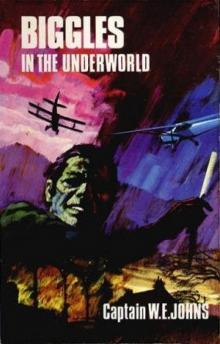 Biggles in the Underworld
Biggles in the Underworld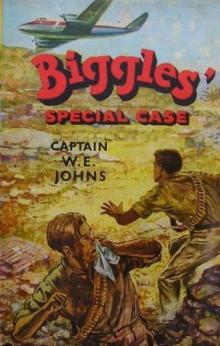 Biggles' Special Case
Biggles' Special Case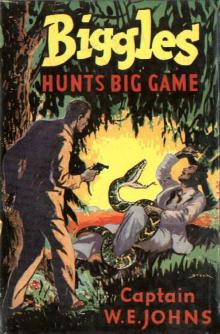 34 Biggles Hunts Big Game
34 Biggles Hunts Big Game 03 Now To The Stars
03 Now To The Stars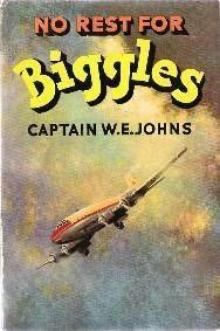 55 No Rest For Biggles
55 No Rest For Biggles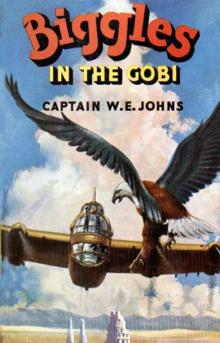 46 Biggles in the Gobi
46 Biggles in the Gobi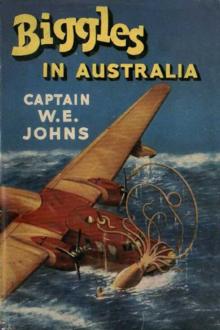 52 Biggles In Australia
52 Biggles In Australia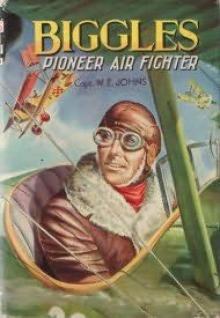 51 Biggles Pioneer Air Fighter
51 Biggles Pioneer Air Fighter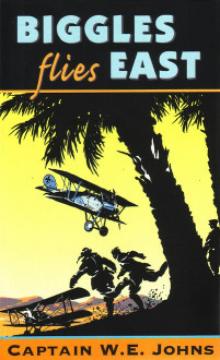 05 Biggles Flies East
05 Biggles Flies East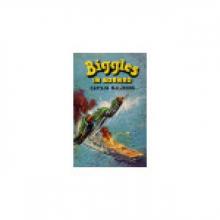 28 Biggles In Borneo
28 Biggles In Borneo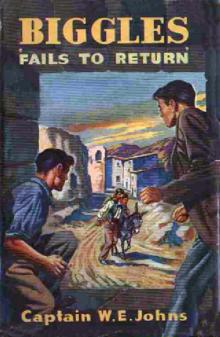 29 Biggles Fails to Return
29 Biggles Fails to Return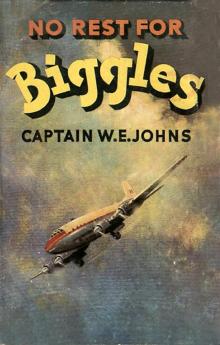 55 No Rest For Biggles (v2)
55 No Rest For Biggles (v2)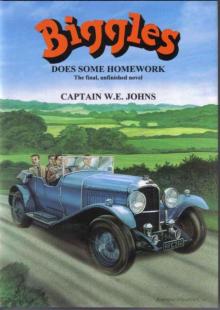 Biggles Does Some Homework
Biggles Does Some Homework Biggles of the Camel Squadron
Biggles of the Camel Squadron 35 Biggles Takes A Holiday
35 Biggles Takes A Holiday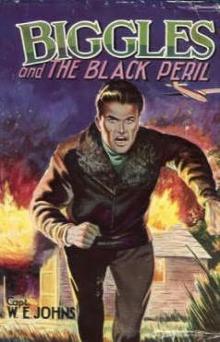 Biggles And The Black Peril (06)
Biggles And The Black Peril (06)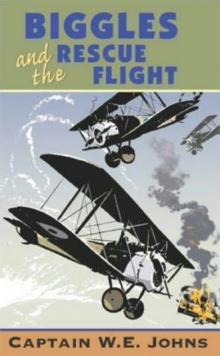 17 Biggles And The Rescue Flight
17 Biggles And The Rescue Flight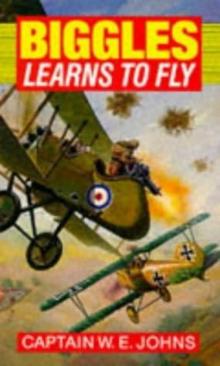 Biggles Learns To Fly
Biggles Learns To Fly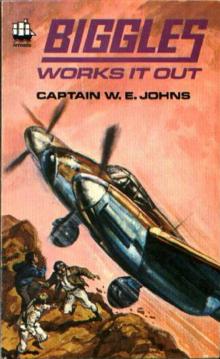 40 Biggles Works It Out
40 Biggles Works It Out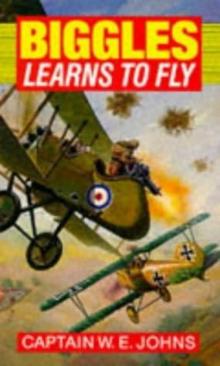 05 Biggles Learns To Fly
05 Biggles Learns To Fly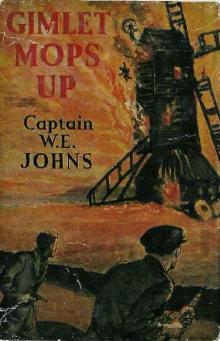 04 Gimlet Mops Up
04 Gimlet Mops Up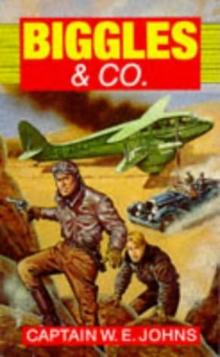 10 Biggles and Co
10 Biggles and Co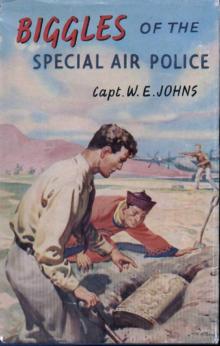 47 Biggles Of The Special Air Police
47 Biggles Of The Special Air Police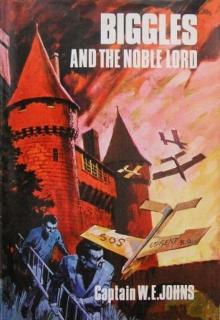 Biggles and the Noble Lord
Biggles and the Noble Lord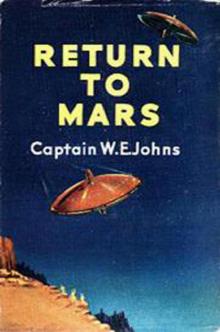 T2 Return To Mars
T2 Return To Mars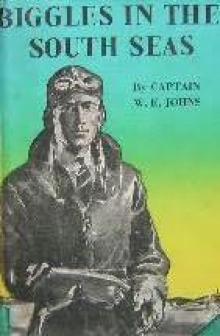 21 Biggles In the South Seas
21 Biggles In the South Seas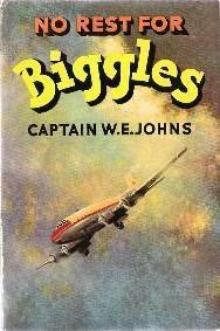 No Rest For Biggles
No Rest For Biggles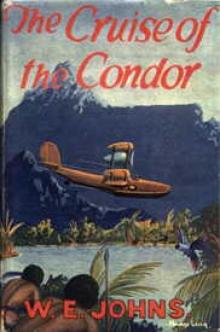 Biggles In The Cruise Of The Condor (02)
Biggles In The Cruise Of The Condor (02)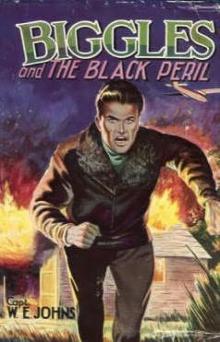 06 Biggles And The Black Peril
06 Biggles And The Black Peril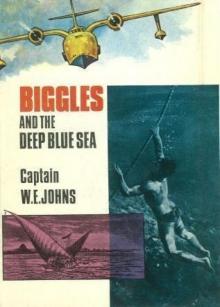 Biggles and the Deep Blue Sea
Biggles and the Deep Blue Sea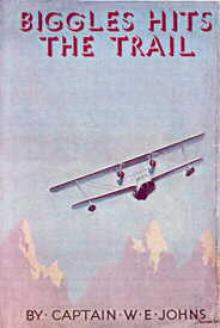 06 Biggles Hits The Trail
06 Biggles Hits The Trail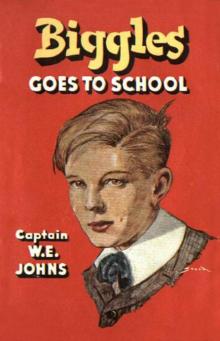 39 Biggles Goes To School
39 Biggles Goes To School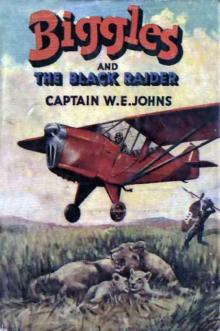 44 Biggles and the Black Raider
44 Biggles and the Black Raider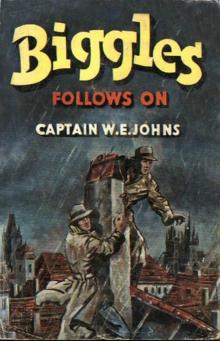 42 Biggles Follows On
42 Biggles Follows On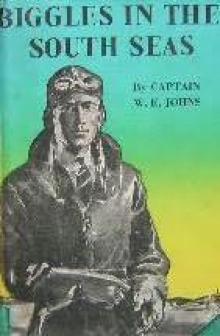 Biggles In the South Seas
Biggles In the South Seas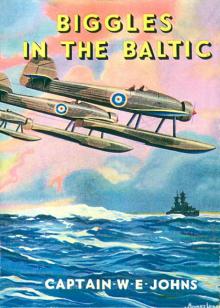 21 Biggles In The Baltic v3
21 Biggles In The Baltic v3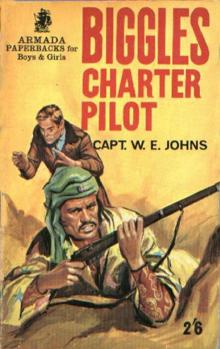 27 Biggles - Charter Pilot
27 Biggles - Charter Pilot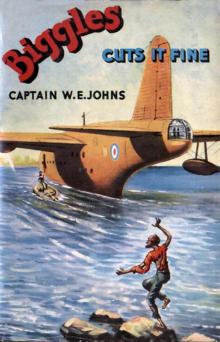 49 Biggles Cuts It Fine
49 Biggles Cuts It Fine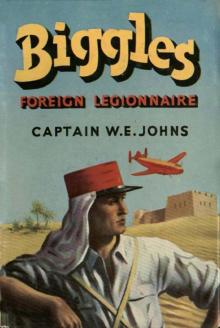 51 Biggles Foreign Legionaire
51 Biggles Foreign Legionaire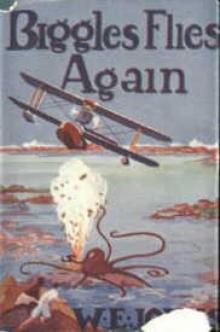 04 Biggles Flies Again
04 Biggles Flies Again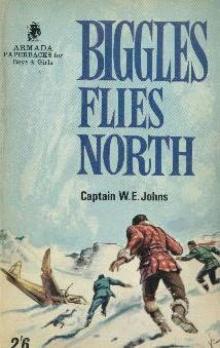 16 Biggles Flies North
16 Biggles Flies North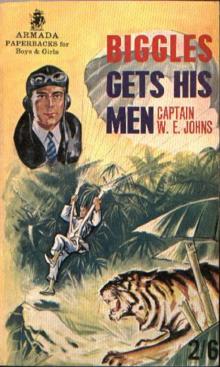 37 Biggles Gets His Men
37 Biggles Gets His Men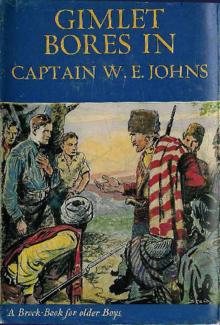 07 Gimlet Bores In
07 Gimlet Bores In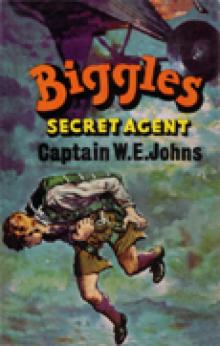 19 Biggles Secret Agent
19 Biggles Secret Agent 32 Biggles In The Orient
32 Biggles In The Orient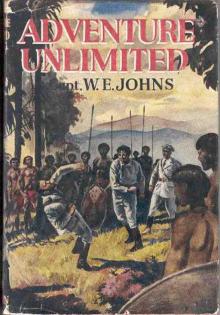 Adventure Unlimited
Adventure Unlimited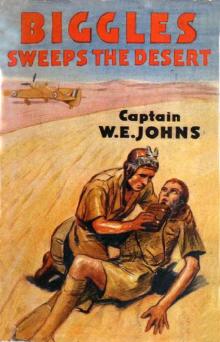 26 Biggles Sweeps The Desert
26 Biggles Sweeps The Desert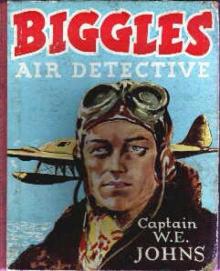 Biggles Air Detective (43)
Biggles Air Detective (43) 36 Biggles Breaks The Silence
36 Biggles Breaks The Silence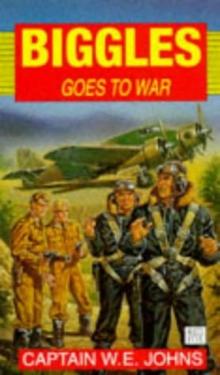 14 Biggles Goes To War
14 Biggles Goes To War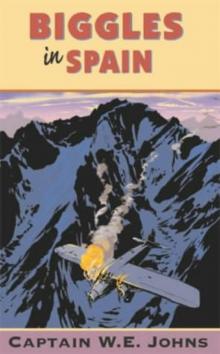 18 Biggles In Spain
18 Biggles In Spain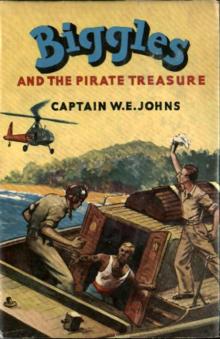 50 Biggles and the Pirate Treasure
50 Biggles and the Pirate Treasure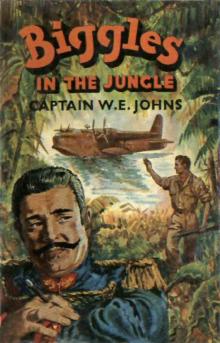 25 Biggles In The Jungle
25 Biggles In The Jungle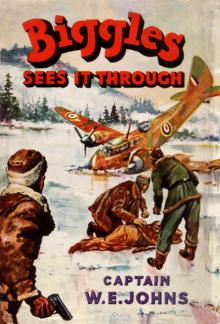 23 Biggles Sees It Through
23 Biggles Sees It Through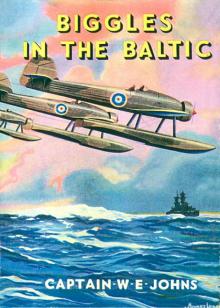 21 Biggles In The Baltic
21 Biggles In The Baltic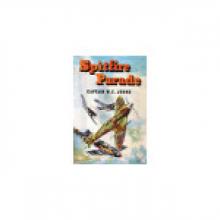 24 Spitfire Parade
24 Spitfire Parade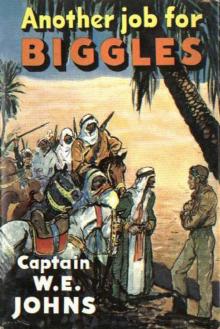 38 Another Job For Biggles
38 Another Job For Biggles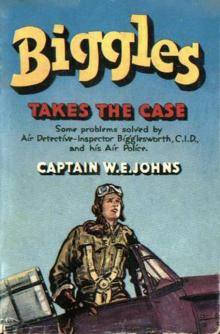 41 Biggles Takes The Case
41 Biggles Takes The Case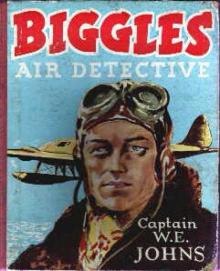 43 Biggles Air Detective
43 Biggles Air Detective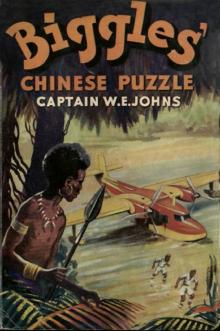 53 Biggles Chinese Puzzle
53 Biggles Chinese Puzzle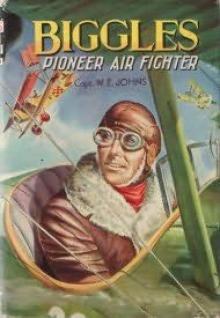 Biggles Pioneer Air Fighter (51)
Biggles Pioneer Air Fighter (51)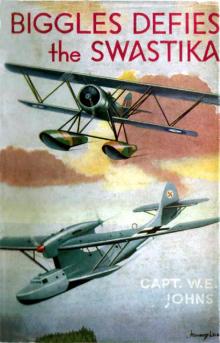 22 Biggles Defies The Swastika
22 Biggles Defies The Swastika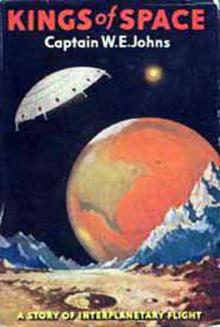 01 Kings Of Space
01 Kings Of Space